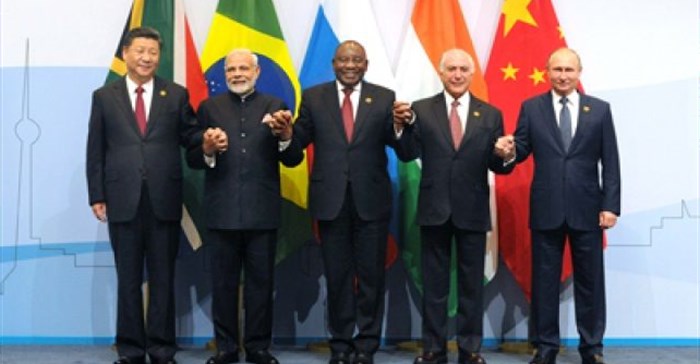
Top stories
More news




















Also dubbed the digital age or revolution 4.0, future business models will be characterised by big data, artificial intelligence, and new technologies.
“This surge in innovation has the potential to dramatically improve productivity and to place entire countries on a new trajectory of prosperity. It has the potential to solve many of the social problems we face by better equipping us to combat disease, hunger and environmental degradation,” said President Cyril Ramaphosa.
Unless the digital age is approached in a collaborative manner, underpinned by a developmental agenda and rapid technological change, it would merely serve to entrench existing disparities within and between countries, he said.
Openness, breaking down trade barriers, education and addressing the imbalance of available skills compared to those required by the digital age were championed as the keys to ensure that bloc nations do not get left behind.
Member states should not become mere adopters of new technologies; instead, they should combine their resources and expertise to become innovators, said Ramaphosa.
“We should not allow technology to shape our societies. We must instead ensure that the needs of our societies shape the technologies that we develop. We must ensure that mastery of the 4th Industrial Revolution does not become the exclusive preserve of just a handful of countries. We must promote inclusivity, diversity and cooperation,” he said.
Guided by the Brics vision to share in inclusive growth, Brazilian President Michel Temer said it is only by opening up their countries that they will realise the fruit of their grouping.
“We can only be competitive if we are open. And I mean open to more sophisticated inputs, advanced technologies, bolder ideas, and open to more investments and trade,” he said.
With the realisation that the there is an imbalance between the skills currently available and those demanded by the digital age, Indian Prime Minister Narendra Modi articulated the need for members to align education and skills in preparation for revolution 4.0.
“We will need to develop school curricular and university courses in such a way that they are able to prepare our youth for the future. We need to ensure that the very fast changes that are taking place in technology [are] reflected in the same pace in our courses,” Modi said.
In line with skills development, Chinese President Xi Jinping announced that his country will host 17 human resources development programmes, where experts from “the five countries will be invited to draw up a blueprint for co-operation in the industrial revolution”.
President of the Russian Federation Vladimir Putin said to enable economic growth in the group, Brics members must “create a comfortable environment to stimulate the economic sectors”, and encourage co-operation among the countries’ respective businesses.
According to Putin, in 2017, Russian trade with Brics countries grew by 30% and to build on this, Russia aims to further develop and support proposals to simplify trade barriers between the respective countries.
SAnews.gov.za is a South African government news service, published by the Government Communication and Information System (GCIS). SAnews.gov.za (formerly BuaNews) was established to provide quick and easy access to articles and feature stories aimed at keeping the public informed about the implementation of government mandates.
Go to: http://www.sanews.gov.za